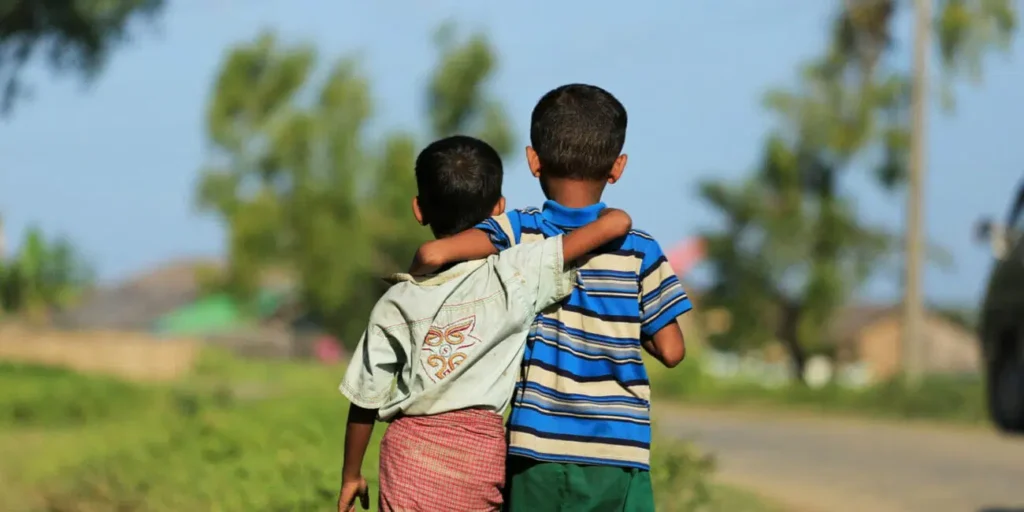Myanmar’s Rohingya People: A Documented History, Identity and Presence
TRANSCEND MEMBERS, 17 Jun 2024
Maung Zarni | FORSEA – TRANSCEND Media Service
While there are multiple inter-communal tensions and attacks among Myanmar’s ethnic communities, there is no other case where a group’s ancestral history and identity have been singled out for sustained and vicious assault in the same way Rohingya people have been.
8 Jun 2024 – Myanmar’s 3-year-old popular resistance – known as Nway Oo or Early Summer Revolution – against Senior General Min Aung Hlaing’s coup regime has triggered a popular recognition of Rohingya as an ethnic people. There is also increasing public acknowledgement of the slow-burning genocide that Rohingyas have been subjected to primarily by the country’s national armed forces, but also by the hybrid government of Aung San Suu Kyi – Min Aung Hlaing.
However, this recognition – and atonement of sorts – in the mainstream Buddhist society, particularly among the young generation of democrats and dissidents, coincides with the emergence of an anti-Rohingya “blood-and-soil” tribal nationalism of the ethnic Rakhine. This has been promoted by the Arakan Army, led by its commander Twan Mrat Naing, also the leader of its political wing known as the United League of Arakan.
It is noteworthy that the militant local Rakhine – predominantly Buddhist – have long collaborated with Myanmar military in the latter’s decades-long persecution of Rohingya people.
In keeping with its genocidal tradition of the majoritarian Buddhist Rakhine society, AA leadership does not consider Rakhine as a part of multi-ethnic Myanmar but pursues an unconcealed separatist vision. Their ultimate goal is to reclaim the ethnic Rakhine’s sovereignty which ended with the Burmese military conquest of Rakhine or Arakan in December of 1784.
Separatism aside, what I find most chilling is Rakhine tribalism has all the hallmarks of blood-and-soil Fascism.
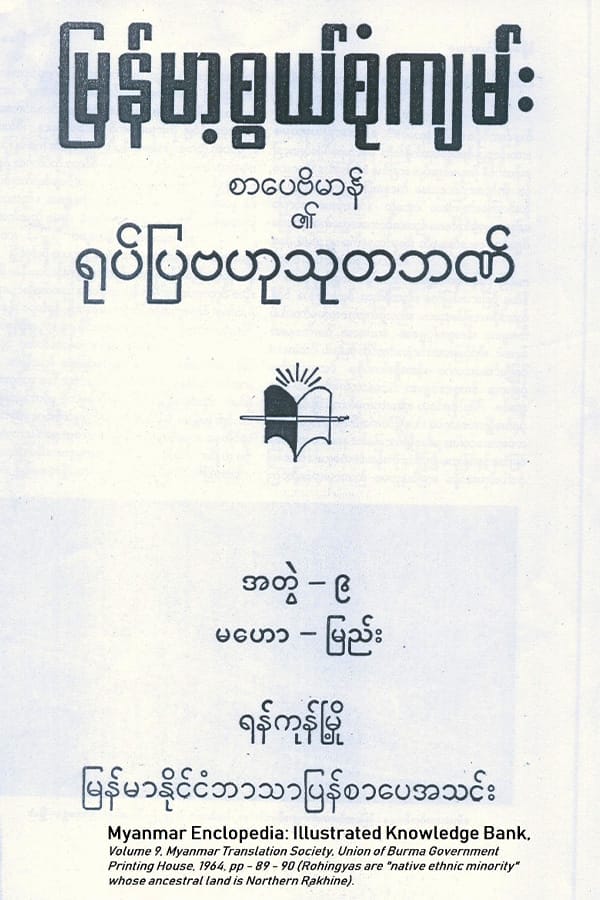
Source: the official/government-published Burmese Encyclopaedia.
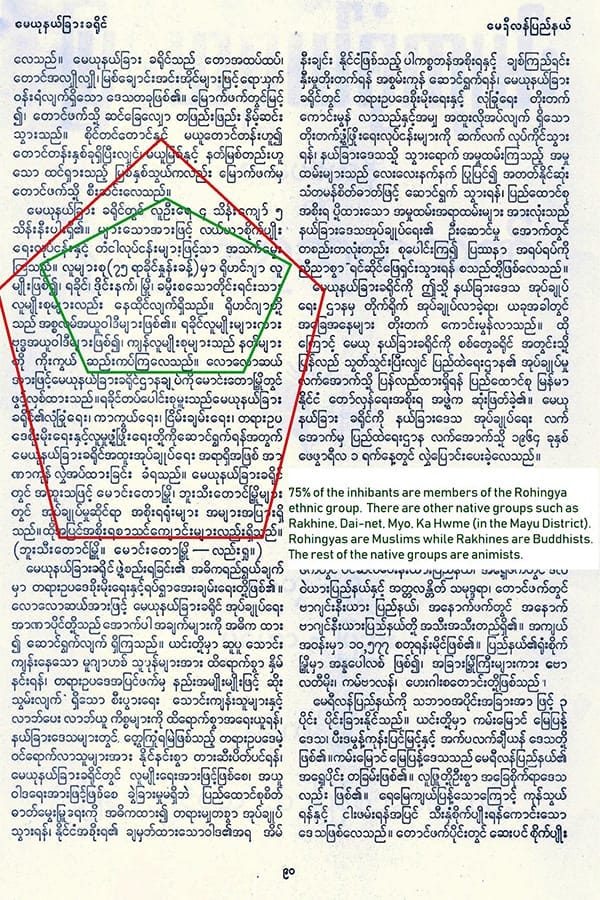
(Vol.9, 1964, pp.89-90), Entry “Mayu District”: “the total population of the district was almost nearly 500, 000. Of the total, 75% of population were Rohingyas.”
These hallmarks can be found in all racisms or tribalist ethno-nationalisms that have infested communities of Myanmar, including the Bama Buddhists, with which I identify myself.
My late PhD mentor, the late Robert L. Koehl, at the University of Wisconsin at Madison, who interrogated surrendered SS officers in the Allied Sections of defeated Germany in 1945 and became a pioneering expert on Heinrich Himmler and SS after the Second World War, described Nazism and Nazis as “neo-feudalism” and “neo-feudalists” [see his “Feudal Aspects of National Socialism.” In: The American Political Science Review 54.4 (1960): 921–933.] I find my late teacher’s analysis of Nazis most relevant in attempting to understand the exceptionally potent ethno-racism that generations of Rakhine nationalists have come to display towards the co-habitant Rohingya of their shared state beside the Bay of Bengal.
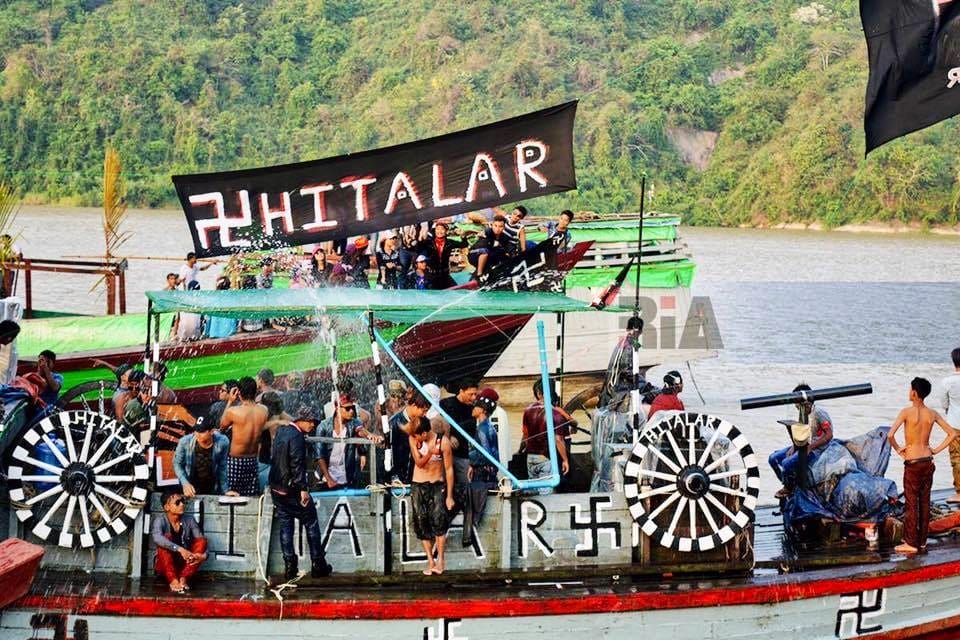
Anonymous: Swastika and Hitler are popular symbols among the Rakhine. Here a boat is seen displaying these symbols during a Rakhine New Year festival which takes place in April.
Twenty years ago, Rakhine exiles that congregated in the Thai border town Mae Sot, across the river from Myanmar’s trading post of Myawaddy, were found to be reading Hitler’s Mein Kempf, approvingly. Inside Myanmar, Rakhine politicians such as Vet Aye Maung who worked with Myanmar military – then known as the State Peace and Development Council – falsely described Hitler as a national hero for the German people while, paradoxically, holding up Israel as a “model” for Rakhine state.
Myanmar’s version of ethnic apartheid
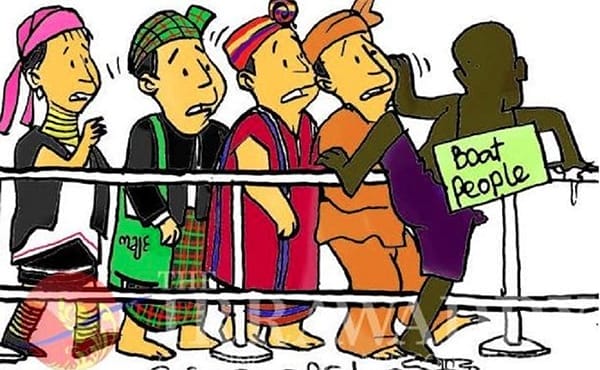
Source: In the years leading up to the 2017 genocidal attack on Rohingya people in Rakhine, the Irrawaddy News Group, the most influential pro-democracy Myanmar language outlet, published this anti-Rohingya cartoon depicting a dark-skinned man skipping the queue in Myanmar, the dark skin symbolizing “illegal Bengali migrants”, specific Myanmar reference to native-born Rohingya people.
The older generations of Rakhine intellectuals and politicians such as the late Rakhine historian Dr Aye Kyaw and a well-known Rakhine academic San Thar Aung, both of the University of Rangoon, were two instrumental drafters of the 1982 Citizenship Act, Myanmar’s version of ethnic apartheid. The act was designed primarily, to deprive Rohingya, the largest ethnic group after Rakhine in Rakhine state, equal and full citizenship during General Ne Win’s racist military dictatorship. They pushed the rest of the committee members to make 1784 the year the Rakhine kingdom was ransacked by the invading Bama from the country’s Dry Zone, to be the cut-off year as a basis for full citizenship.
Of the two Rakhine drafters of 1982 Citizenship Law, the late Dr Aye Kyaw was a fellow exile and a good friend of mine while I was based in USA for 17 years (1988-2005). In his interview some years ago, the Rakhi historian told the Irrawaddy News Group that the Rakhine drafters had to accept a compromise offered by the chair of the drafting committee, the late Dr Maung Maung, who was General Ne Win’s legal adviser and a Myanmar nationalist from my hometown of Mandalay. Maung Maung’s cut-off year for any group to qualify for full and equal citizenship was written into that essentially apartheid 1982 Citizenship Law as 1823, the year before the start of the 1st Anglo-Burmese War at the end of which the British (East India Company) defeated Myanmar troops and snatched Rakhine as a newest possession.
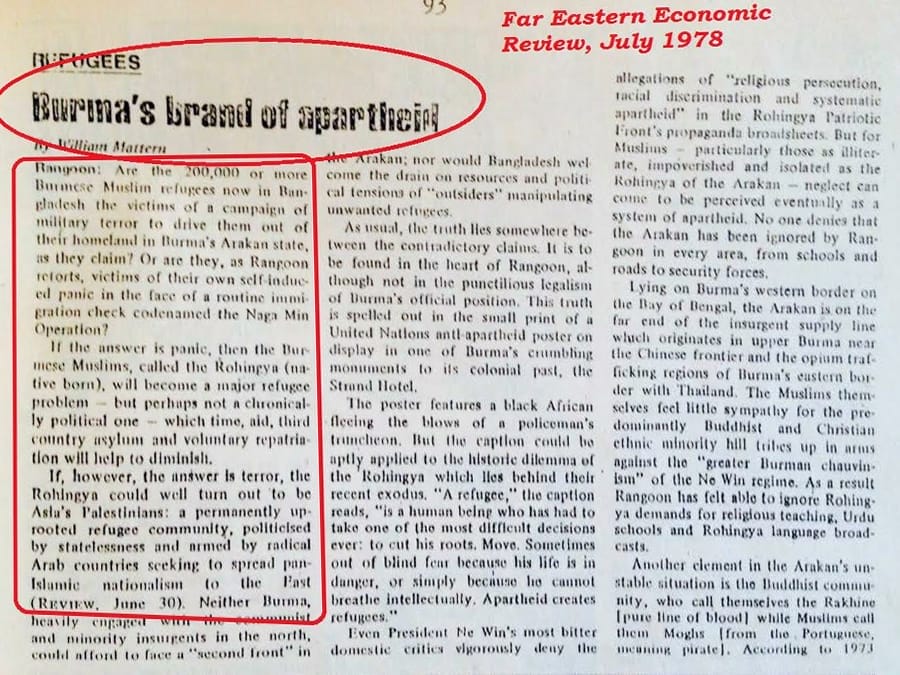
Source: Far Eastern Economic Review, 14 July 1978 ran a news story about the 1st wave of genocidal expulsion of Rohingya Muslims from Rakhine by General Ne Win’s regime.
To date, the popular and official narratives, as well as symbolisms surrounding the Arakan Army and its leader Twan Mrat Naing are littered with neo-feudal vocabularies – “the new noble king” (in reference to Tun Myat Naing himself), the old glorious kingdom of Arakan, the superior noble race of Rakhine (vis-à-vis “kular” (or a racist slur in reference to those with Indo-Aryan ancestral origin from the Indian sub-continent).

June, 2024: Arakha Army leader, Tut Myat Naing, during a VOA interview. Wikimedia Commons
Besides neo-feudalist outlook, all genocidaires seek to destroy the (Ethnic) Other (s) on the basis of the latter’s group identity – racial, ethnic, national or religious. This is one of the most important intellectual contributions Raphael Lemkin, the father of the Genocide Convention, made to our understanding of intentional physical destruction of weak and vulnerable populations. Physical destruction is often preceded by the identity destruction and history erasure by the perpetrating groups, typically militarily stronger.
While there are multiple inter-communal tensions and attacks among Myanmar’s ethnic communities, there is no other case where a group’s ancestral history and identity have been singled out for sustained and vicious assault in the same way Rohingya people have been.
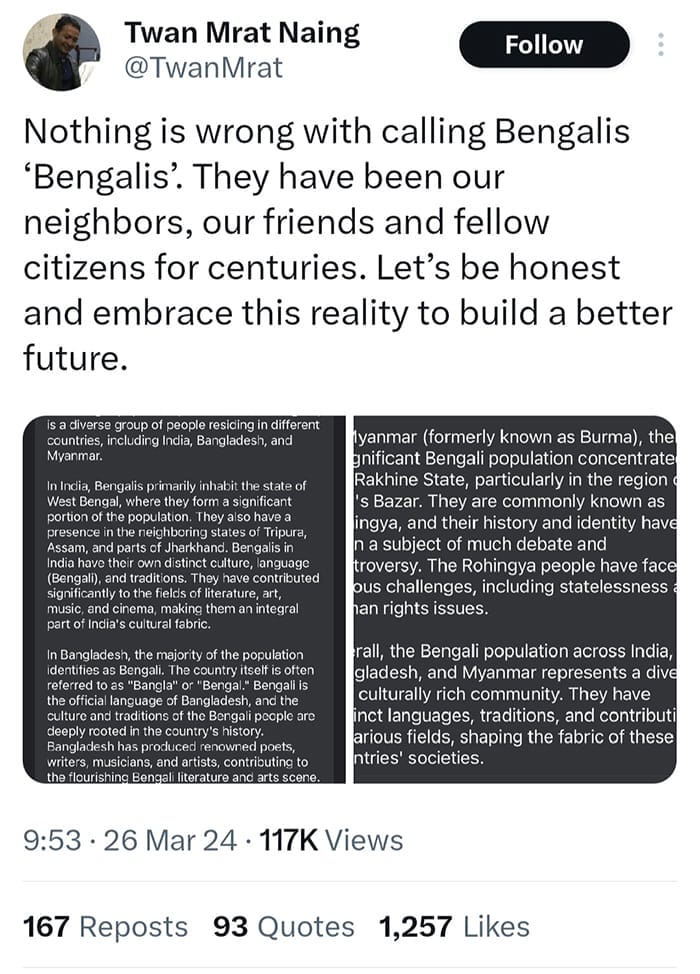
Source: A screenshot of Arakan Army (AA) commander Twan Mrat Naing’s post on X regarding Rohingya group identity, which was very popular with Rakhine supporters of AA. Calling Rohingya “Bengalis” is intended to convey the false impression that Rohingya belong in Bangladesh, not in Rakhine, Western Myanmar, despite historical and official evidence to the contrary. This is a pattern of genocidal behaviour which Myanmar military and Aung San Suu Kyi herself have popularized. It is intended to de-recognize and erase Rohingya group identity.
Noteworthy is the fact that such attacks among the rest of the multi-ethnic communities, including Bama Buddhists, have subsided – if not altogether disappeared. But, growing in military strength and gaining control of territories in Rakhine, the Arakan Army nationalist leadership and its grassroots Rakhine supporters have publicly stepped up their efforts to destroy Rohingya identity and erase their ancestral history.
The slow-burning genocide of a vulnerable population
All good students of ethnicity and races would readily admit the constructivist nature of all ethnic (and racial) identities. That is, group identities are invented or constructed. They would also know that “pure” blood-based notions of identities give rise to garden variety Fascisms (White Nationalism, Aryan ideology, White Supremacy, Japanese Fascism, Hindutva ideology, and so on). As such, Rohingya identity is no more or no less authentic than Rakhine or Bama or Kachin or Chin group identities of Myanmar. The act of subjecting the Rohingya identity – of all invention ethnicities of Myanmar – to such sustained and vicious degree of scrutiny is in and of itself a fundamental component in what my wife Dr Natalie Brinham and I have called the slow-burning genocide of a vulnerable population singled out for physical destruction.
FORSEA board member and a noted SOAS historian Professor Michael W. Charney was responsible for dusting up and putting into academic circulation a very important piece of primary historical writing by Francis Buchanan, “a Scottish surgeon, surveyor and botanist who made significant contributions as a geographer and zoologist,” which documented the already well-established Rohingya identity and presence in pre-British Rakhine in 1799. [See Untitled Document (soas.ac.uk) ]
___________________________________________
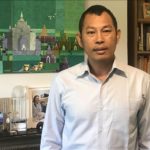 A Buddhist humanist from Burma (Myanmar), Maung Zarni, nominated for the 2024 Nobel Peace Prize, is a member of the TRANSCEND Network for Peace Development Environment, former Visiting Lecturer with Harvard Medical School, specializing in racism and violence in Burma and Sri Lanka, and Non-resident Scholar in Genocide Studies with Documentation Center – Cambodia. Zarni is the co-founder of FORSEA, a grass-roots organization of Southeast Asian human rights defenders, coordinator for Strategic Affairs for Free Rohingya Coalition, and an adviser to the European Centre for the Study of Extremism, Cambridge. Zarni holds a PhD (U Wisconsin at Madison) and a MA (U California), and has held various teaching, research and visiting fellowships at the universities in Asia, Europe and USA including Oxford, LSE, UCL Institute of Education, National-Louis, Malaya, and Brunei. He is the recipient of the “Cultivation of Harmony” award from the Parliament of the World’s Religions (2015). His analyses have appeared in leading newspapers including the New York Times, The Guardian and the Times. Among his academic publications on Rohingya genocide are The Slow-Burning Genocide of Myanmar’s Rohingyas (Pacific Rim Law and Policy Journal), An Evolution of Rohingya Persecution in Myanmar: From Strategic Embrace to Genocide, (Middle East Institute, American University), and Myanmar’s State-directed Persecution of Rohingyas and Other Muslims (Brown World Affairs Journal). He co-authored, with Natalie Brinham, Essays on Myanmar Genocide.
A Buddhist humanist from Burma (Myanmar), Maung Zarni, nominated for the 2024 Nobel Peace Prize, is a member of the TRANSCEND Network for Peace Development Environment, former Visiting Lecturer with Harvard Medical School, specializing in racism and violence in Burma and Sri Lanka, and Non-resident Scholar in Genocide Studies with Documentation Center – Cambodia. Zarni is the co-founder of FORSEA, a grass-roots organization of Southeast Asian human rights defenders, coordinator for Strategic Affairs for Free Rohingya Coalition, and an adviser to the European Centre for the Study of Extremism, Cambridge. Zarni holds a PhD (U Wisconsin at Madison) and a MA (U California), and has held various teaching, research and visiting fellowships at the universities in Asia, Europe and USA including Oxford, LSE, UCL Institute of Education, National-Louis, Malaya, and Brunei. He is the recipient of the “Cultivation of Harmony” award from the Parliament of the World’s Religions (2015). His analyses have appeared in leading newspapers including the New York Times, The Guardian and the Times. Among his academic publications on Rohingya genocide are The Slow-Burning Genocide of Myanmar’s Rohingyas (Pacific Rim Law and Policy Journal), An Evolution of Rohingya Persecution in Myanmar: From Strategic Embrace to Genocide, (Middle East Institute, American University), and Myanmar’s State-directed Persecution of Rohingyas and Other Muslims (Brown World Affairs Journal). He co-authored, with Natalie Brinham, Essays on Myanmar Genocide.
Tags: Activism, Asia and the Pacific, Burma/Myanmar, Genocide, Genocide Studies, Muslims, Rohingya, Violent conflict
DISCLAIMER: The statements, views and opinions expressed in pieces republished here are solely those of the authors and do not necessarily represent those of TMS. In accordance with title 17 U.S.C. section 107, this material is distributed without profit to those who have expressed a prior interest in receiving the included information for research and educational purposes. TMS has no affiliation whatsoever with the originator of this article nor is TMS endorsed or sponsored by the originator. “GO TO ORIGINAL” links are provided as a convenience to our readers and allow for verification of authenticity. However, as originating pages are often updated by their originating host sites, the versions posted may not match the versions our readers view when clicking the “GO TO ORIGINAL” links. This site contains copyrighted material the use of which has not always been specifically authorized by the copyright owner. We are making such material available in our efforts to advance understanding of environmental, political, human rights, economic, democracy, scientific, and social justice issues, etc. We believe this constitutes a ‘fair use’ of any such copyrighted material as provided for in section 107 of the US Copyright Law. In accordance with Title 17 U.S.C. Section 107, the material on this site is distributed without profit to those who have expressed a prior interest in receiving the included information for research and educational purposes. For more information go to: http://www.law.cornell.edu/uscode/17/107.shtml. If you wish to use copyrighted material from this site for purposes of your own that go beyond ‘fair use’, you must obtain permission from the copyright owner.
Join the discussion!
We welcome debate and dissent, but personal — ad hominem — attacks (on authors, other users or any individual), abuse and defamatory language will not be tolerated. Nor will we tolerate attempts to deliberately disrupt discussions. We aim to maintain an inviting space to focus on intelligent interactions and debates.
